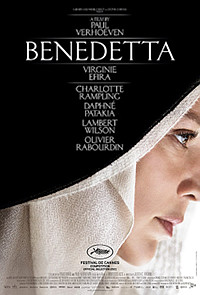| SHADOWS ON THE WALL | REVIEWS | NEWS | FESTIVAL | AWARDS | Q&A | ABOUT | TALKBACK | |||||||||||||||||||||||||||||
 Shadows off the beaten path Shadows off the beaten pathIndies, foreign, docs and shorts...
On this page:
BENEDETTA |
LOVE, SPELLS AND ALL THAT |
MEMORIA
| |||||||||||||||||||||||||||||
| See also: SHADOWS FILM FESTIVAL | Last update 17.Oct.21 | |||||||||||||||||||||||||||||
|
Benedetta Review by Rich Cline | 
CANNES FILM FEST  Is it streaming?
| 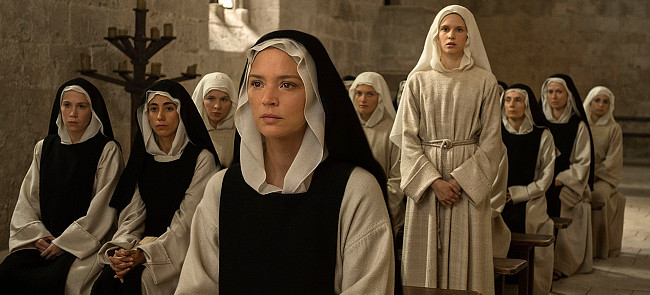 Leave it to Paul Verhoeven to turn the true story of Sister Benedetta into a lurid religious horror romp with equal measures of fervour and lust. More than a little camp, this biopic is deliberately provocative as it adds steamy melodrama to real-life events. It's skilfully assembled, with strong period detail and a vicious sense of humour. So even if it plays loosely with facts, it remains devilishly entertaining. In early 1600s Italy, Benedetta (Efira) has lived in a convent for nearly 20 years when she has her first vision of Jesus, which is soon followed by the stigmata. Abbess Felicita (Rampling) and her daughter Sister Christina (Chevillotte) are dubious, but the local priest (Pierre) and Provost (Rabourdin) believe her. And the other sisters are so taken by Benedetta's spirituality that they elect her to be the new abbess. Then Felicita discovers that Benedetta is secretly exploring sexuality with Sister Bartolomea (Patakia), so she summons the Papal Nonce (Wilson) and his torturous minions. The story unfolds largely through Benedetta's eyes, from her arrival at the convent as a young girl to her early flirtation with Bartolomea, who had been badly abused by her father and brothers. Benedetta's spiritual visions are presented vividly, including the comical reactions of the sisters who can't see what she sees. And the story builds into a battle between Benedetta and Bartolomea and an increasing force that is growing against them, just as a comet streaks through the sky and the black death arrives at the city gates. In the central role, Efira plays Benedetta with a modern sensibility as a smart, educated young woman who is much more aware than people expect. The fabulous Rampling underplays her villainous role beautifully; Felicita thinks Benedetta must either be faithful or a madwoman, but never suspects that she might be a master manipulator. Patakia and Chevillotte have their own strong scenes, and Lambert provides his superb screen presence to fire up the outrageous final act. Verhoeven seems happy to keep the story centred around some grisly violence and nun-on-nun sexuality, while letting any deeper ideas lurk only in the shadowy margins. There's a chance here to explore fervent belief, religious mania, the power of the church and even perhaps mental illness issues. All of these things are gurgling around unexplored as the action gets increasingly freaky. But at least there's a layer of enigma to Benedetta that should revive interest in who she really was.
|
| Love, Spells and All That Aşk, Büyü Vs. Review by Rich Cline | 
| 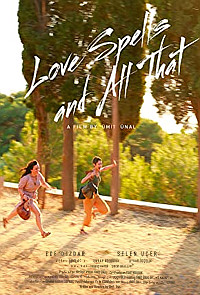 dir-scr Umit Unal prd M Tayfur Aydin, Umit Unal, Fuat Volkan with Ece Dizdar, Selen Ucer, Uygar Ozcelik, Aysenil Samlioglu, Emrah Kolukisa, Damla Ersan, Tonguc Rador, Sirzat Bilallar, Murat Toprak, Melisa Demir, Gizem Katmer, Rohat Culum release Tur 22.May.21, US Aug.21 ofla, UK 25.Oct.21 19/Turkey 1h36 Is it streaming?
| 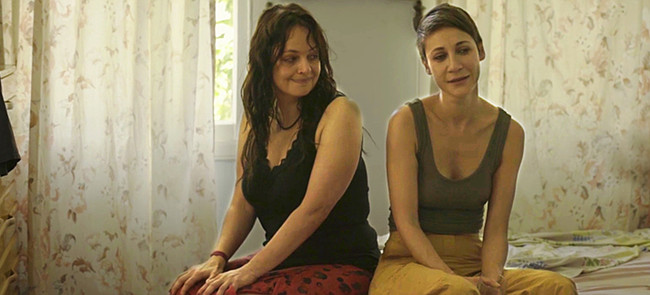 Warm and earthy, this Turkish drama is remarkably grounded, with dialog that's honest and tough. Essentially an extended conversation with various interruptions, the film shifts through a range of moods, shot in widescreen to beautifully capture locations while paying close attention to two central characters and their internal journeys. It's a witty, powerful exploration of how feelings can linger strongly for years, even when separated from a loved one. After 20 years away, Eren (Dizdar) returns to her home island and tracks down Reyhan (Ucer), her teen girlfriend, to tell her that she has never been able to forget her. Reyhan dismisses their youthful romance as a phase. But Eren protests: "It's like I'm under a spell." This pauses Reyhan in her tracks as she remembers getting a woman to cast a spell on Eren two decades ago that would compel her to return. So they start to talk, revisiting their lives together and apart, discovering things they never knew about the intervening decades. As they speak, both women reveal momentous and hugely emotional things about themselves, but writer-director Unal maintains an easy atmosphere. They also reminisce about their strong connection as teens, and how they were caught by their parents and rejected. Their passion and anger is extremely realistic, as are the stories of violence and thoughts of suicide over the years. And Reyhan is scared that Eren is going to upset what little peace she has found with her boyfriend Gokhan (Ozcelik). The actors are naturalistic and understated, trying to hold their feelings inside, but often unable to prevent them from seeping out. Dizdar gives Eren a dark yearning that contains a morsel of hope, even as Reyhan forcefully tells her to leave. Ucer reveals the same submerged feelings in Reyhan, deliberately buried further. So the way these two women interact is fascinating, especially as they use the physical space between them or fall into a wrenching embrace. Waves of memories rush over Eren as she walks around the island. This isn't nostalgia, is a surging rush of big emotions tempered by a lifetime of coping with expectations, gossip and rejection. As they revisit places that once meant something to them while also seeking a way to break the spell, little adventures allow them to rediscover each other. They both seem to understand that there's no ritual that can undo their past, and watching them work out their true feelings is surprisingly moving.
|
| Memoria Review by Rich Cline | 
| 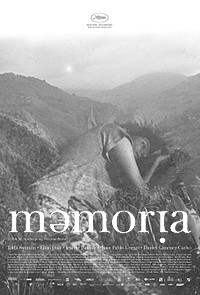 dir-scr Apichatpong Weerasethakul prd Apichatpong Weerasethakul, Diana Bustamante, Simon Field, Keith Griffiths, Charles de Meaux, Michael Weber, Julio Chavezmontes with Tilda Swinton, Elkin Diaz, Jeanne Balibar, Juan Pablo Urrego, Daniel Gimenez Cacho, Agnes Brekke, Jeronimo Baron, Constanza Gutierrez, Daniel Toro release Col 30.Sep.21, US 26.Dec.21, UK 14.Jan.22 21/Colombia 2h16 CANNES FILM FEST TORONTO FILM FEST  Is it streaming?
| 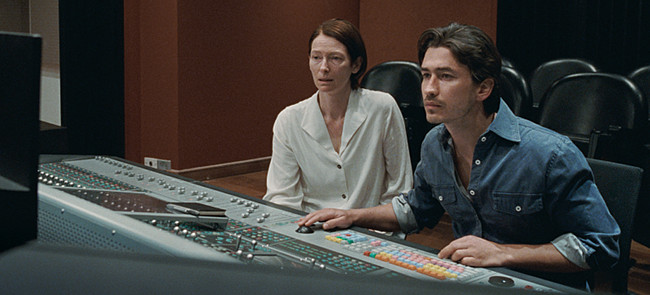 Thai filmmaker Apichatpong Weerasethakul makes his first foray abroad, taking an international cast on an evocative odyssey set in various beautifully shot locations in Colombia. It's the kind of film that only hints at its meaning, requiring faith from the audience as we're taken a journey that's haunting for reasons we can barely define. It's a beautiful exploration of sights, sounds and, as the title says, memory. Visiting Bogota, British anthropologist and flower-seller Jessica (Swinton) checks in on her sister Karen (Brekke), who's in hospital for an inexplicable reason. Because she's hearing a strange, loud boom inside her head, Jessica contacts sound engineer Hernan (Urrego) to try and figure out where it might be coming from. Meanwhile, tunnel works have unearthed ancient skeletons, so on her way back to her home in Medellin, Jessica stops to check them out. Then along a tiny river, she meets an older fisherman named Hernan (Diaz), and she seems to have an unspoken connection with him. Scenes often long, wide shots that feature extended periods of silence. Images and sounds add layers to each moment, sometimes anachronistically, while the tone shifts in gentle ripples. All of this is utterly entrancing, with added moments of witty humour, such as when a doctor's unexpected reply when Jessica asks for medicine to calm her senses. There's a yearning curiosity flowing through the whole film, plus wonderful twists of Lynchian absurdity. Basically it's a movie that's impossible to pin down, and it's bursting with possibilities. Swinton brings her considerable presence to bear in a minimalistic role that pulls the audience in. Often sitting and staring, or just thinking to herself, even her stillness is riveting. And she finds specific rhythms with her costars, most notably Diaz and Urrego as the two Hernans. Both are intriguing and interested, offering left-field commentary that deepens and complicates the narrative. And there are more everyday connections in the scenes with Brekke and Cacho (as Karen's husband Juan). This is a movie that takes you on a fascinating trip, so it's better to just go along for the ride and stop trying to work out what it means. Ideas come along in a constant flow, creating possible explanations and resonances. And because Weerasethakul's approach is so visceral, the imagery will stick with you, encouraging you to ponder the way history continues to vibrate in the stones around us. And how perhaps the things that link us together aren't meant to make sense.
| 
See also: SHADOWS FILM FESTIVAL © 2021 by Rich Cline, Shadows
on the Wall
HOME | REVIEWS | NEWS | FESTIVAL | AWARDS
| Q&A | ABOUT | TALKBACK | | ||||||||||||||||||
